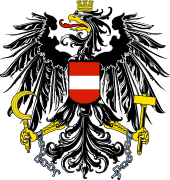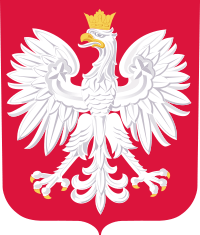Austria–Poland relations
Austrian–Polish relations refer to the relationship between the Republic of Austria and the Republic of Poland.
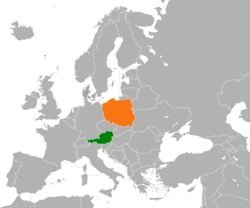 | |
Austria |
Poland |
|---|---|
The two nations have a very long historical relationship, which was mostly complicated throughout history.[1] At the highest peak of their power, the Polish–Lithuanian Commonwealth and Austria's Habsburg Monarchy enjoyed a very strong and cordial relationship, as Polish hussars under the banner of John III Sobieski had helped Austrians to fend off the Turks in the Battle of Vienna, and there had been many internal and political exchanges between two states. However, Austria's participation in the partitions of Poland with Prussia and Russia a century later strained the relations. Numerous revolts against Austrian rule occurred in Austria-occupied Poland, including the Hungarian Revolution of 1848 in then-Kingdom of Hungary, which the Poles played a significant part on the revolution. Nonetheless, among all three nations, Austria was the most tolerant towards the Poles. In the 20th century, following the collapse of Austria-Hungary, Austria and Poland re-established relations, only to be interrupted by Nazi Germany's annexation of Austria and later invasion of Poland together with the Soviet Union. After World War II, both re-established relations, but this time it was a relationship between the now-modern day Austria and then-Polish People's Republic, a communist satellite of the Soviet Union. Austria was under the Western bloc, closely tied to the West and the United States, while Poland was under communist rule. Their relationship once again deteriorated, only to be resumed at 1989 following the collapse of the Eastern Bloc. Since then, the relationship between two nations has undergone significant progress, as Austria supported Poland to join NATO and European Union, which Poland joined, 1999 and 2004, respectively. Currently, the relationship between the two nations is considered excellent.
History
The first recognized relations between two states dated back from the Teutonic Order, a German-based military organization. For several years, there had been repeated conflicts between the Kingdom of Poland and the Teutonics. At its height, the Poles defeated the Teutonic Germans in the Battle of Grunwald, thus weakened the Order and paved way for Poland to emerge as a powerful nation in Europe.
At 1683, hearing the new about Ottoman's siege of Vienna, Polish King John III Sobieski had rallied a large amount of Polish hussars and fought together with the Christian alliance.[2] After the victory, he did have a meeting with Leopold, then ruler of Holy Roman Empire, but it wasn't successful due to deep disagreement between the two.[3]
However, at 18th century, growing Russian influence and the expansion of Russia within the decline of the Polish–Lithuanian Commonwealth, Austria switched their supports from Poland to Russia, and Russian political dominance of Poland was further enhanced with the partitions of Poland, in which Austria was one of the main parties alongside Russia and Prussia.[4] Austria, however, acquired only the smallest part of partitioned Poland following the last partition at 1795, which included the city of Kraków that would later become the cultural and political capital of Polish people in exile during the partition. During the Austrian rule however, Austria was the least suppressive of Polish minority, mainly, due to the country's multi-ethnic situation and its tolerance in comparison to strong suppression of Polish minorities in Prussia, later Germany and Russia. There was even an autonomous region for Polish minority, known as Kingdom of Galicia and Lodomeria.
Despite such level of tolerance, Poles were quite active demanding independence and political rights, including the notable Hungarian Revolution of 1848. A Polish General, Józef Bem, went on their conflict against Austrian rulers[5] and had caused many hardships for Austrian Army. The revolution only stopped when Russian reinforcement arrived and quelled the revolution in blood. From then, Austria became harsher and harsher towards the Poles, although it nonetheless remained the most tolerant towards Polish minority.
At World War I, Austrian Emperor Franz Joseph I, fearing a Polish mutiny if they had been fighting in one same battalion, decided to spare out Polish regiments into small part in order to prevent any Polish uprising letting to the independence of Poland. Nonetheless, the Polish battalions had planned to work out together in order to use the war as a chance to resurrect Polish nation after a century being partitioned by Russia, Austria and Germany.[6] After the war, Poland regained independence from Austria.
Modern relations
Relationship between two nations started at 1920 but it was a tense era and there had been no formal contact as most Eastern Europe was razed by wars. The newly established Republic of Poland and the Austrian Republic did not enjoy any extensive relations outside ambassador level; and it was same like most of Eastern Europe back then.[7]
However, relationship between two nations disappeared at 1938, following the Anschluss which Nazi Germany annexed Austria. Until 1945, relationship between Austria and Poland mostly varied throughout the relationship between Germany and Poland, which would later go tense due to German invasion of Poland, thus sparked the World War II. Austria, a majority German-speaking country that share cultural commons with Germany, participated in the occupation of Poland and had committed many crimes against Polish people under the banner of Nazi Germany.
After World War II
After the war, Poland went on to be occupied by Soviet Union while Austria was occupied by the United States, Great Britain, France and Soviet Union, therefore two countries followed different political systems. Austria went on to re-establish themselves as a Republic, pledging neutrality, while Poland became communist satellite of Soviet Union. As such for later political climate, relationship between Austria and Poland was tense and cool, as there had been only low contact between two states throughout the Cold War. A massive Polish refugees, mostly escaping from communist rule, settled in Austria and formed a small community of Polish diaspora in Austria. This situation remained until 1989, with the collapse of communism across Europe, that the relationship between two sees another booming point again.
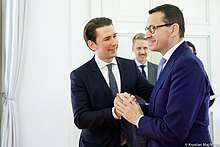
Modern relations
Since the end of communism at 1989 in Poland, Austria has been a supporter of Poland's integration to the Western world. Both two nations enjoy significant progress, as Poland joined NATO and European Union which Austria is a permanent member. Recently, there has been stronger economic and democratic cooperations between two nations, such as mutual civil law and document.[8]
Recently there has been disagreements between Poland and Austria over the Syrian refugee crisis due to the ongoing Syrian Civil War.
Resident diplomatic missions
- Austria has an embassy in Warsaw and a consulate-general in Kraków.
- Poland has an embassy in Vienna.
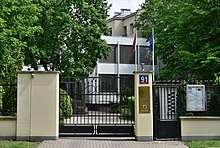 Embassy of Austria in Warsaw
Embassy of Austria in Warsaw Consulate-General of Austria in Kraków
Consulate-General of Austria in Kraków
Diplomacy
See also
- Poles in Austria
- Austrians in Poland
References
- (in German)
- "The 1683 Battle of Vienna: Islam at Vienna's Gates".
- "The Secret History of the Reign of Jan Sobieski, 1683 AD". Fordham University.
- The Three Partitions, 1764-95
- "NameBright - Coming Soon". Historicaltextarchive.com. Retrieved 2019-03-24.
- "World War I: Restoring Poland". Library of Congress. January 25, 2017.
- "Eastern Europe During the Inter-War Years (1919-1938)".
- "Polish-Austrian Agreement on mutual relations in the field of civil law and on documents". Cambridge University Press.
External links
- Austrian Embassy Warsaw (in German and Polish)
- Embassy of the Republic of Poland, Vienna, Austria (in German and Polish)
